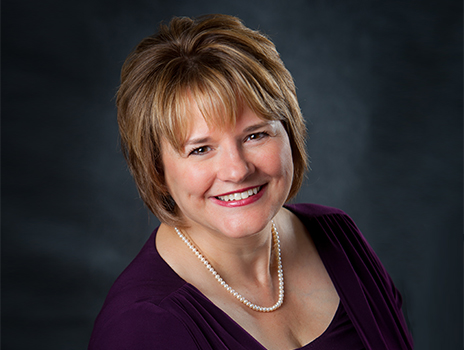- Home
- News Room
- Patient Stories
- DIEP is Right for Breast Reconstruction Patient
April 05, 2019
"Adapt, improvise and overcome."
Lori Baerg and her family live by this mantra. It’s carried them through as former business owners and been a source of academic and athletic motivation for her 2 sons.
But the words took on a more poignant meaning for Lori's family when she was diagnosed with breast cancer in August 2016.
Lori, of Lee's Summit, Missouri, was 47 when she learned of the malignant mass deep within her left breast. She had a mastectomy less than 2 months later. At the time, she knew little about breast cancer, and looked to her surgeons for guidance.
Initially, surgeons at another healthcare organization recommended moving quickly to remove her other healthy breast and reconstruct both using artificial implants, but Lori had reservations. Listening to her gut, she dove headlong into learning all she could about the type of cancer she had, invasive ductal carcinoma, and reconstruction options.
The more you know
"I think I as in denial for the first 8 months after my diagnosis," says Lori. "But I tend to meet stressful situations head-on. Or maybe it felt like denial, because I was taking all these steps to overcome this challenge."
Lori's friends bought her "Breast Cancer for Dummies." "I think I read it cover to cover in about 2 hours," she says. "It completely changed my thought processes. I knew I needed to do more research and reach out for more answers and options."
In her search for answers, she turned to The University of Kansas Cancer Center, which offered a multidisciplinary treatment approach with breast surgical oncologists at the region’s only National Cancer Institute-designated cancer center.
Lori was offered various procedures for breast reconstruction, but chose DIEP breast reconstruction (deep inferior epigastric perforator flap) and plastic surgeon Eric Lai, MD, at the cancer center.
"When I found DIEP (pronounced deep) and knew it would be my own tissue (to reconstruct my breast), not foreign material, that just felt right for me," says Lori, who was pleased to learn that her breast surgical oncologist could save her healthy breast.
Right choice. Right care team.
"Lori is a very positive patient, always upbeat," says Dr. Lai. "She had a very serious diagnosis, but she didn't let that dictate her demeanor, and she always asked the right questions."
Less than 2 months after her diagnosis, Lori had a plan for breast reconstruction. Because she had a unilateral mastectomy of the left breast and wanted to reconstruct using her own tissue, Dr. Lai agreed that the uni-DIEP procedure was a good choice. "For the DIEP, we use the patient's abdominal tissue to reconstruct the breast – taking a football-sized portion of tissue between belly button and waistline, and preserving as much of the rectus (or 6-pack) muscle as we can," says Dr. Lai.
DIEP reconstruction requires 4 to 5 weeks of recovery. "Ultimately, these women are very happy because they have a breast reconstruction that feels and looks like their own tissue, and that's because it is," says Dr. Lai. "Unlike implants, it grows with you and doesn't have to be replaced years later."
Lori is confident DIEP was right for her. "I feel more natural, more comfortable," she says. And she's even more comfortable in the choice of her care team. "I couldn't be in better care than with Dr. Lai and this team. They're not only gifted as doctors and caregivers, but as human beings."
You're not alone
Though Lori's journey isn't over, she continues her determined, positive outlook. "Every day is a new normal, but I focus on moving forward, staying healthy and keeping my mind active. My kids influence me heavily on how to handle cancer. They're always there to keep me laughing and positive. My husband is a rock and has been with me every step of the way."
She hopes to encourage other women to adapt, improvise and overcome the weight of breast cancer's emotional, physical and financial stress. She's considering developing a forum to help women in search of answers and support.
"Women deserve multiple options. You need to do the research and choose what's best for you," she says. "And find a support system right away." Lori says she's found valuable resources through The University of Kansas Cancer Center, letting her know she didn't have to go it alone.
"Reach out to church, family, neighbors and other survivors. Let them know your struggle," she says. "I learned that others love to give, and you have to allow them that joy."
